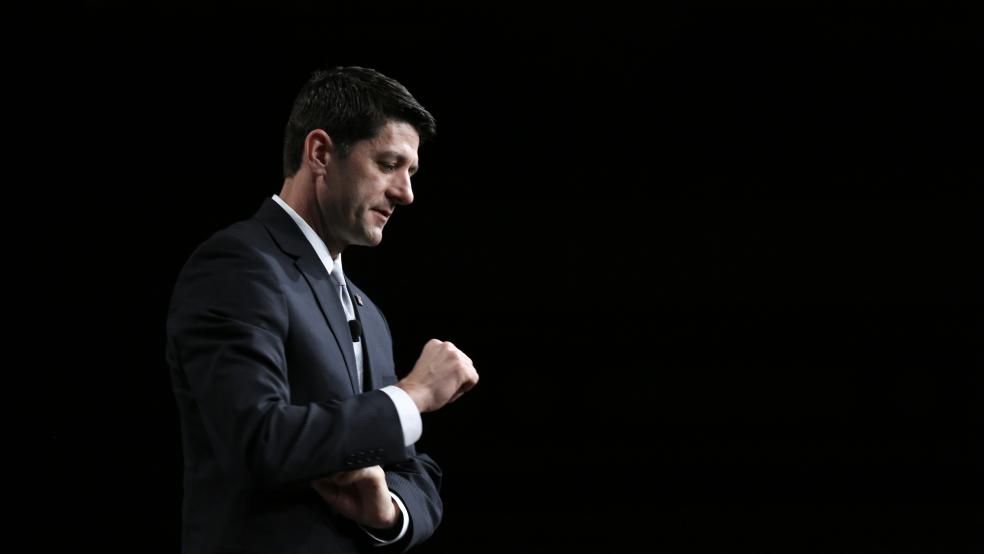House Speaker Paul Ryan is looking lonelier and lonelier as Republicans in the House and Senate – and even President Trump -- continue to distance themselves from the proposed American Health Care Act, House leadership’s plan to repeal the Affordable Care Act. Already facing opposition from both conservative and moderate Republicans, the report from the Congressional Budget Office issued on Monday only increased divisions in a party that will need almost perfect unity to succeed in passing the legislation.
The CBO’s report found that the bill could cost up to 24 million Americans their health insurance by 2026, a problem that has even lawmakers normally loyal to the Republican leadership in the House shaking their heads.
Related: How the GOP Health Plan Would ‘Devastate’ Mentally Ill, Addicted
Virginia Congressman Rob Wittman wrote on his Facebook page Monday night, “I do believe that we can enact meaningful health care reforms that put the patient and health care provider back at the center of our healthcare system, but this bill is not the right answer.”
On the Senate side, where passage of the bill as written is even more in doubt than it is in the House, Republican moderates were plainly alarmed at the coverage numbers.
“The top line numbers are alarming,” Maine Sen. Susan Collins told reporters on Monday night. “These kinds of estimates are going to cause revisions in the bill, almost certainly. I don’t think that the bill that is being considered now is the bill that ultimately will be the one that we vote on in the Senate.”
Even Texas Sen. John Cornyn, the Majority Whip, conceded that eliminating coverage for 24 million people might be a bridge too far. “Obviously, we want to improve those coverage numbers,” he told reporters on Monday.
Related: GOP Replacement Plan Could Send Hospital Costs Soaring Again
But the biggest problem facing Ryan may be that all indications are that the person with the largest megaphone in the discussion, President Trump, appears to be moving in a direction that would worsen, not improve, coverage rates.
Trump has been leaning toward changes to the bill that House conservatives, like Freedom Caucus leader Mark Meadows of North Carolina want to see, according to Politico. Meadows and others in his caucus have expressed strong reservations about the AHCA, complaining that it leaves too much of the ACA intact and that its introduction of refundable tax credits for purchasing insurance on the open market amount to the creation of a new entitlement program.
Ohio Rep. Jim Jordan, an influential voice within the Freedom Caucus, appeared on Fox News Tuesday morning and blasted the plan. “This bill doesn’t repeal Obamacare,” he said. “This bill doesn’t unite Republicans. This bill doesn’t bring down the cost of premiums.”
He added, “There’s a reason every major conservative organization in the country is opposed to this legislation.”
Related: Republican Health Plan -- Good for the Budget, Bad for the Poor and Elderly
Lawmakers like Meadows and Jordan are vitally important to the bill’s passage because the Freedom Caucus, by itself, has enough votes to derail the legislation in the House of Representatives, even if everyone else in the Republican conference remains united.
To appease conservatives, Politico reports, Trump and his senior advisers have been indicating that they are open to changes to the legislation, such as speeding up the phase-out of the ACA’s Medicaid expansion and accelerating other changes to the healthcare market.
Of course, those changes won’t just do zero to address the number of people who lose their insurance under AHCA. It will only make sure that they lose it even faster.
The White House seems to be banking on the idea that by appeasing conservatives, the bill will be able to get through the House, even if it loses a small number of supporters among Republicans concerned about the coverage losses.
Related: GOP’s Repeal of Obamacare Taxes Could Put Medicare Closer to Insolvency
But Paul Ryan’s biggest problem is greater than just getting the bill through the House. He needs a bill that can also pass the Senate.
Normally, it’s not the job of the House Speaker to worry about votes in the other chamber. But Ryan will be asking his members to vote on a proposal that will be featured in every Democratic House candidate’s campaign advertisements in 2018, and he can’t ask them to do that without offering a reasonable path by which the measure becomes law.
Right now, he doesn’t have one, and unfortunately for the House Speaker, every concession he makes to conservatives makes it less likely he will find one. In the Senate, Republicans can only afford to lose three votes without killing the legislation, and even that would require a tie-breaking vote by the vice president.
Changes to the bill that further depress the percentage of Americans with insurance coverage, or accelerate the loss of coverage are only going to harden the opposition it faces from Senate Republicans like Maine’s Collins and others who have expressed concern about the proposal’s effects on the uninsured rate.
It’s a dilemma that offers the Speaker no obvious way out, and help from the White House doesn’t seem to be forthcoming.





